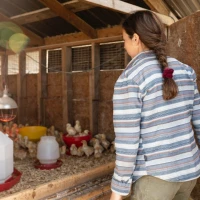As backyard chicken enthusiasts and poultry farmers seek to offer a diverse diet to their feathered friends, the question arises – can chickens eat cauliflower? This cruciferous vegetable is known for its nutritional value for humans, but does it hold the same benefits for chickens? If you’ve ever asked yourself this question, you are not alone. It’s essential to understand what foods are healthy for chickens to ensure they live long, productive lives. This comprehensive guide aims to explore the suitability of cauliflower as a part of the chicken diet and how it impacts their well-being.
Chickens are not only a source of fresh eggs but also entertaining and engaging pets that require a balanced and nutritious diet. As kaleidoscopic as their diet may seem, there are certain limitations to what chickens can and cannot consume safely. Understanding these dietary confines is crucial to maintain their optimal health. Cauliflower, a vegetable rich in vitamins and low in calories, seems to be a likely candidate as a healthy snack, but let’s delve deeper into the facts to ascertain if this vegitable is indeed a beneficial addition to a chicken’s diet.
The Nutritional Profile of Cauliflower and Its Impact on Chickens
Before we delve into whether chickens can chickens have broccoli safely munch on cauliflower, let’s examine the nutritional assets of this vegetable. Cauliflower is a low-calorie food packed with vitamins, minerals, and antioxidants. With vitamins C, K, and folate, cauliflower boasts its place among the nutrient-dense foods recommended for a human diet. However, the question remains:
What Does Cauliflower Offer to Chickens?
Understanding the needs of poultry is vital. can chickens eat broccoli benefit from a varied diet, including grains, proteins, vegetables, and fruits. Given cauliflower’s nutritional prowess, let’s explore its specific benefits for chickens:
- Vitamin C: Chickens, unlike humans, can produce vitamin C naturally. However, adding vitamin C to their diet can boost their immunity and combat stress, especially during hot weather or molting.
- Vitamin K: Essential for blood clotting, Vitamin K in cauliflower may help in keeping your chickens’ circulatory system healthy.
- Fiber: The dietary fibers in cauliflower assist in healthy digestion for chickens, aiding in smoother bowel movements and gut health.
- Antioxidants: Like humans, chickens benefit from antioxidants. They help in preventing cellular damage, reinforcing the chickens’ immune system.
Possible Risks Associated with Feeding Cauliflower to Chickens
While there are benefits, one must also consider possible risks. Some vegetables can chickens eat brussel sprouts cause issues such as bloating or digestive discomfort in chickens, and elements like oxalic acid can lead to the formation of kidney stones. Does cauliflower pose similar risks? Let’s investigate further.
How to Safely Introduce Cauliflower Into a Chicken’s Diet
Proceeding with caution is the best approach when introducing any new food into your chicken feed for mango treess’ diet. Here are a few recommendations to ensure that your chickens can enjoy cauliflower without any adverse effects:
Start With Small Quantities
As with all new foods, start small. A few florets of cauliflower can chickens eat cabbage be a good beginning to gauge how your chickens react to the new addition.
Observe Their Response
Be vigilant about their behavior and droppings afterwards. Any signs of discomfort or unusual droppings may indicate that cauliflower does not sit well with your flock beautiful hill.
Keep Cauliflower as a Treat, Not a Staple
Cauliflower should not replace the main components of a chicken’s diet, such as layer pellets, grains, and other protein sources. Instead, it should be regarded as a treat or a supplement.
Prepare the Cauliflower Appropriately
Raw or cooked cauliflower is acceptable, but ensure that it is free of any condiments or additional seasonings that could be harmful to chickens. Cutting the cauliflower into small, manageable pieces will make it easier for them to eat.
Combining Cauliflower with Other Chicken-Friendly Foods
To make cauliflower an even more attractive option for chickens, consider pairing it with other safe and healthy foods. Variety is key in a chicken’s diet; here are some companion foods that you can offer with cauliflower:
- Leafy Greens: Such as lettuce, spinach, or kale, providing them with additional vitamins and minerals.
- Cooked Grains: Rice or pasta can serve as filling and energy-providing treats when mixed with cauliflower.
- Fruits: Like blueberries or chopped apples add a sweet twist to the snack, offering extra hydration and nutrients.
Balancing these foods with cauliflower ensures that your flock receives a well-rounded array of nutrients without any single item overpowering their diet.
Feeding Practices to Avoid When Offering Cauliflower
Steer clear of certain practices that could turn cauliflower from a nutritious snack into a potential risk for your chickens. Here’s what to avoid:
- Overfeeding: Too much of any treat can lead to nutritional imbalances. Stick to the 90/10 rule—90% of their diet should be their regular feed, with only 10% consisting of treats like cauliflower.
- Seasoned or Processed Cauliflower: Seasonings, oils, and processed foods can be harmful to chickens. Always serve cauliflower in its purest form.
- Not Providing Enough Water: Always ensure fresh water is available, especially when feeding your chickens fibrous foods that may affect hydration levels.
Conclusion: A Verdict on Cauliflower for Chickens
After extensive discussion and research, it’s evident that cauliflower can indeed be a healthy and safe treat for chickens, given that it is offered in moderation and prepared properly. This cruciferous vegetable can add variety to their diet and supply them with additional nutrients. However, mindfulness in portion control and preparation is key to ensuring they can enjoy cauliflower without any negative effects.
Incorporating cauliflower into your chickens’ diet can offer a host of benefits, but it’s not without its precautionary measures. By following the guidelines and feeding practices outlined in this guide, you can rest assured that you are providing your flock with a wholesome and delicious treat. So go ahead, share a floret or two with your chickens, and watch them peck away happily at their new favorite snack!










